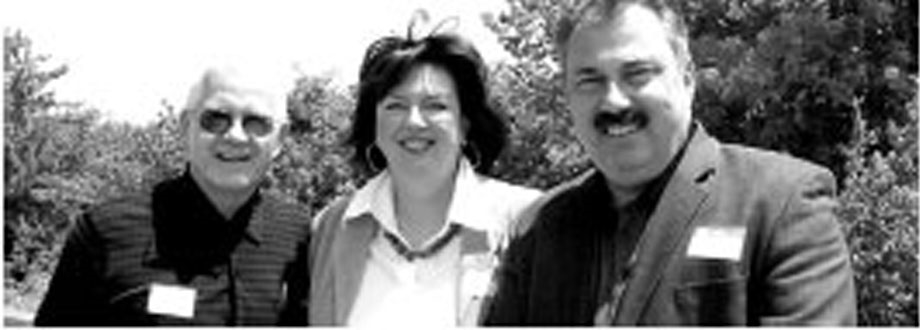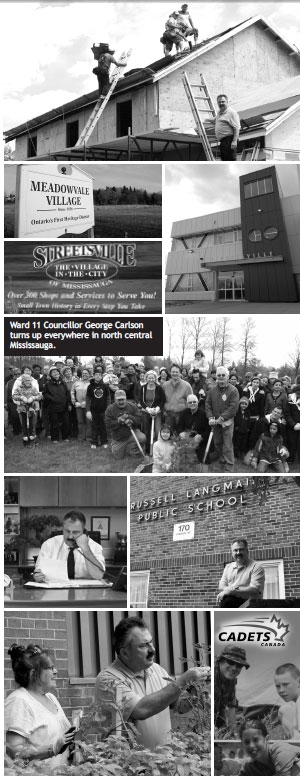Enjoying remarkable comfort in who he is and what he’s doing, this local politician exudes confidence in Mississauga’s future. Words by Mike Douglas
“I’m just a local boy made good.” offers the rounded affable City Councillor for Ward 11. George Carlson sits in khakis and pullover, on the edge of his office couch, attentive, engaged for a new conversation. If you don’t enjoy talking with people then politics may be more trial and tribulation than it’s worth. For George Carlson, politics is more than fun “It’s in my blood.”
“I came from a very political background.” he explains. “On the Rutledge side of the family, my grandfather, Ed Rutledge was Chief of Police in Streetsville and his grandfather was on the first Town Council. I have ancestors who were postmasters, Councillors and game wardens. My father worked for the school board. I grew up putting up election signs with my dad’s friends. For them there was the New Testament and the Conservative Party of Ontario.”
His forebears influence how Councillor Carlson sees things today, as an extension of an old United Empire Loyalist tradition that lives on, “If you see genuine need, you try to help, and it’s an honour to be in public life to try to fix things.”
In 1982 at age 24, Carlson was ready to fix things at City hall and ran for Council in Ward 9 against Ted Southorn and lost, but received one third of the vote. He ran again in ‘85 for Peel Public School Board Trustee and barely snuck in after a tight three way race. In ’91 he ran again for Councillor in the old Ward 9 against Pat Saito and lost.
In ‘94 he ran for Trustee on the Peel Board of Education and suffered a bitter defeat, losing by just 23 votes. But two years later, after a Provincial investigation, the outcome was overturned and he was awarded the Trustee’s part-time job with its $5,000 a year salary. It was proven that the winning candidate placed a third candidate’s name on the ballot so that it would precede Carlson’s alphabetically and this false candidate garnered 800 votes. (Up to ten percent of voters check off the first name they see on a ballot!)
It was during this time that his longstanding friendship with Carolyn Parrish was cemented in a job as her Communications Director for her Federal riding office. In 2000 Carlson would run for Council in Ward 6 and win. He won again in 2003. In 2006, Ward 6, the
largest ward in the country was divided into two even parts and Carlson would win the new Ward 11, while Parrish would win the Council seat in the reconstituted Ward 6.
Today Ward 11 is a combination of the old and new; 200 year old villages alongside new subdivisions. The original Streetsville and Meadowvale villages are typically concerned with preservation of heritage while the new subdivisions need mechanical services like
lights, schools, facilities and sidewalks. As for ‘Pill Hill’, home of the multinational pharmaceutical firms, they don’t seem to need much attention at all.
For Councillor Carlson his job still often entails making house calls; to look at a neighbour’s fence or listen to a barking dog, to check out the new garden or to just have a beer and chat.
A former Sea Cadet, Carlson has been Chairman of the Streetsville Cadet Corps for 30 years and recently enjoyed a win-win situation for city cadets and for the Mississauga Heritage Advisory Committee, which he also chairs. With his encouragement and fundraising
leadership, the City purchased Streetsville’s old Russell Langmaid School as the new home for all Mississauga Cadets, effectively preserving the stately old school.
“Those 400 Cadets’ faces are from around the world. They’re a very diverse group.” His efforts with the Cadets earned him the Queen’s Jubilee Medal for volunteerism.
Working with the Streetsville Business Improvement Association and architect Michael Spaziani, they remade a Heritage Lawn Bowling clubhouse into the BIA’s new offices. City staff often chides him for renovating old buildings – one even called him “The Junk Landlord of the City”, he smiles.
Carlson is very pleased that they will be adding more than 150 acres to the City’s parkland with the purchase of a farm along the Credit River valley. Looking ahead there is much to be happy about for Mississauga – “The fundamentals in this city are so good.”
However, he underlines some persistent money problems like the markedly lower than average rates of Provincial funding for social services and housing in Peel Region.
“We’re viewed as the cash cow for Ontario and are screwed by successive provincial governments from all parties, whether it’s for housing, anti-poverty or social services. And I have never had a satisfactory explanation made to me. I think it’s because we’re perceived as wealthy.”
Carlson notes that at least a third of the City’s work is social work; that Mississauga subsidizes dozens of worthy programs and the monies all come from property taxes. “We need to be partners included in the proceeds from federal and provincial taxes.” He cites transit costs as a popular example – “If Mississauga Transit operates in part as a subsidy for low wage earners to get to their
jobs, whose problem is that?”
Carlson thinks there has to be a spirit of flexibility to help the City find its way in the new green economy. “But Mississauga is in much better shape than most cities.” he adds, “We have choices we can make, free of crippling debt or crumbling infrastructure. Mississauga can re-tool, while other cities, less fortunate, have to rebuild.”

